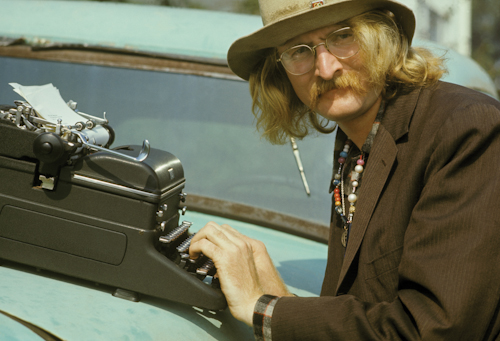A miscast spokesperson of drugged-out hippies, the writer Richard Brautigan wasn’t enamored with narcotics nor the wide-eyed, bell-bottomed set. He wrote two things I love: The 1967 novel Trout Fishing in America and the 1968 poem “All Watched Over by Machines of Loving Grace.” The opening of “King of the Granola Heads” Michael LaPointe’s Times Literary Supplement review of a new book about the iconoclastic author:
“Richard Brautigan, the Love Generation’s prickly and whimsical poet-novelist, died what the sheriff’s report termed an ‘unattended death’ on September 16, 1984. Having committed suicide with one of his beloved Smith & Wesson revolvers, Brautigan was not discovered in his home in Bolinas, California until October 25, at which point he needed to be ‘scooped up with a shovel.’ Why did Brautigan, the author of bestselling, generation-defining novels such as Trout Fishing in America and In Watermelon Sugar, die so alone? In Jubilee Hitchhiker, William Hjortsberg maps the rocketing rise and disastrous decline of this most quixotic American author.
Born in 1935 to a single mother in Tacoma, Washington, Richard Gary Brautigan was destined for a life on the fringes. He was even, at first, estranged from his own name, his mother borrowing the surname Porterfield from one of his many stepfathers. Unmoored from ancestry, Brautigan would always be a self-mythologizer, complicating the biographer’s task, but in the early, ‘Dick Porterfield’ chapters of Jubilee Hitchhiker, Hjortsberg disentangles events from their embellishments. ‘Imagination feeds on the irrational,’ he writes, and Brautigan’s young mind was given a steady diet. The midcentury Pacific Northwest has the larger-than-life dimensions of legend, complete with a near-apocalyptic flood, which the Porterfield family was the last to escape, ‘watching the highway fold up behind them ‘like scrambled eggs.’
After the deluge, Brautigan acquired his major trope: ‘Fishing consumed [his] life.’ With his towering height, white-blond, soup bowl haircut and overalls, the young Brautigan resembled Tom Sawyer, ‘hitchhiking up the McKenzie in the rain with a fly rod under his arm and a peanut butter sandwich in his pocket.’ Brautigan would always retain an anachronistic quality. By the age of twelve, he was collecting cans, blackberries and nightcrawlers to help the family make ends meet. In 1956, he hitchhiked down to San Francisco and never saw or spoke to his family again.” (Thanks Browser.)
See also:

